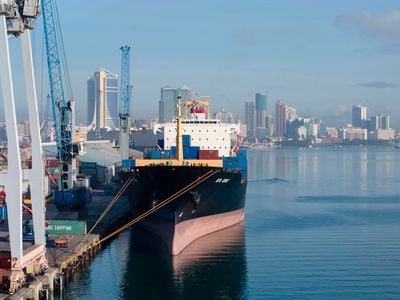
Tanzania’s High Court on Thursday dismissed a petition by four private citizens challenging the legality of the government’s new ports management deal with the United Arab Emirates and have it voided on constitutional grounds.
A three-judge High Court panel sitting in Mbeya ruled that the constitutional case was “barren of fruits” and lacked merit in almost all its aspects, including petitioners’ claims that the agreement contained clauses that violated Tanzania’s constitution and endangered national sovereignty and security.
Tanzania and the UAE signed a memorandum of understanding in February 2022 for DP World, a multinational logistics company headquartered in Dubai, to run the port of Dar es Salaam, initially, before expanding to run other ports in mainland Tanzania, depending on subsequent negotiations.
Read: Samia’s efforts pay off as UAE firms troop in
The MoU was followed by an Inter-Governmental Agreement (IGA) titled Economic and Social Partnership for the Development and Improving Performance of Sea and Lake Ports in Tanzania, signed by Works and Transport Minister Prof Makame Mbarawa with President Samia Suluhu Hassan’s consent in October, had been endorsed by parliament on June 10 this year.
Since then, the IGA has drawn much public scepticism over how its conditions may impact Tanzania’s long-term control over its sea and lake ports.
Critics include opposition leaders, religious clerics and legal experts who have questioned why the pact does not have an end date and excludes ports in Zanzibar where President Samia comes from.
The government and the ruling Chama Cha Mapinduzi (CCM) party officials have vehemently denied claims that the deal amounts to a “sell-off” of one of Tanzania’s prime properties to foreign investors and stressed that the IGA is not “final” since it will be followed by a Host Government Agreement (HGA) and Lease/Concession Agreement which will provide room for changes if necessary.
Read: Port deal outrage sends Samia, CCM to early campaigns
In the Mbeya case, petitioners Alphonce Lusako, Emmanuel Chengula, Raphael Ngonde and Frank Nyalusi – all lawyers by trade – had argued that the IGA was “non-applicable” to Tanzania because of its constitutional breaches and contraventions of laws designed to protect Tanzania’s natural wealth and resources.
In addition to putting Tanzania’s sovereignty and security at risk, they alleged that it was also approved by parliament without following proper legal procedures including ensuring sufficient public participation.
The respondents were the Attorney General on behalf of the government, the Minister for Works and Transport and his Permanent Secretary, and the Clerk of the National Assembly. Among the issues brought before the three-judge panel for ruling was whether the IGA could be considered a proper contract in itself under Tanzanian law and whether Tanzania’s parliament had legal authority to endorse it without public involvement.
In their 91-page ruling, Judges Dunstan Ndunguru, Mustafa Ismail and Abdi Kagomba rejected outright the claim of constitutional breaches and approved the IGA as an admissible “framework” document for future binding agreements related to the initial MoU that should offer more clarity on the scope, commercial terms and benefits of the entire project.
“The invocation of Article 28 of the constitution as a testimony of erosion of sovereignty is utterly erroneous as issues of sovereignty under the provision are limited to defence and security and do not include matters of trade and investment,” they asserted.
The ruling interpreted the IGA as a “facilitative instrument for dispute settlement between the parties” and agreed with the respondents that “specific agreements will be more particular” on the nitty-gritty details of DP World’s future operations at the port of Dar es Salaam.
According to the judges, raising specific issues which would be addressed by the HGA, project or lease/concession agreements would be “premature.”
Read: Dubai deal exposes inefficiences at Dar port
On parliament’s role in endorsing the IGA, they said section 4 of the Natural Wealth and Resources Act No. 6 of 2017 gave the National Assembly powers to “review any arrangements or agreements made by the government relating to natural wealth and resources” and ensure that unconscionable terms were rectified or removed.
“If any of the covenants of the IGA was considered or deemed to be unconscionable, the powers to order renegotiation or any other remedy would not come from any other institution than the National Assembly,” they said.
And despite upholding the petitioners’ claim that the 24-hour notice issued by the Clerk of the National Assembly for the public to submit their views prior to tabling the document in parliament was too short to allow for sufficient public input, the judges declared that the legislative body would not have been “bound by such public opinion anyway.”
The lead counsel for the petitioners, Boniface Mwabukusi, said later that they intended to lodge an appeal against the ruling with the Court of Appeal.


